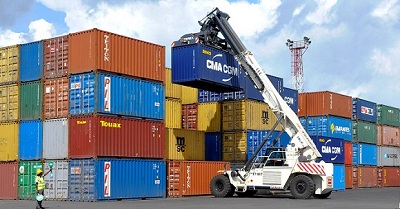
Non-VAT registered importers to pay 12.5% upfront
The Ghana Revenue Authority (GRA) will start the imposition of an upfront 12.5 per cent Value Added Tax (VAT) on the customs value of taxable goods at all ports of entry with effect from Tuesday, June 6, this year.
Advertisement
The development will affect importers of taxable goods who are not registered to charge VAT.
It is applicable to taxable goods imported into the country for home consumption, taxable uncustomed goods forfeited and auctioned and taxable goods on transfer from bonded facilities.
It means importers of taxable goods who are not registered with the authority for tax will pay the upfront VAT in addition to the import duties and other taxes on the total value of the goods imported.
It follows the amendment of the VAT Act, 2013 (Act 870) which imposed the upfront payment of VAT by unregistered importers as an administrative measure to enhance the performance of VAT.
These came to light when the GRA engaged media practitioners on the implementation of the 12.5 per cent upfront payment in Accra last Thursday.
Not a new tax
The Commissioner of the Domestic Tax Revenue Division of the GRA, Edward Gyambrah, explained that the move was “a compliance tool and not a new tax”.
He stated that all those who were tax compliant would not be affected.
Ahead of the implementation of the amended law, the Commissioner said the GRA had engaged various stakeholders, including the Ghana Union of Traders Association (GUTA), the Association of Ghana Industries (AGI), the Institute of Freight Forwarders and the Custom Brokers Association of Ghana, among others.
Mr Gyambrah further stated that the law which was passed in 2020 was aimed at ensuring parity in the pricing of goods on the market to ensure fairness, as VAT registered taxpayers charged the tax on their imported goods on the domestic front.
He said it would help identify unregistered importers of taxable goods who did not charge VAT on their domestic supplies and ensure tax compliance as importers of taxable goods were required to register with the GRA and file their tax returns as well as make it easy to identify non-compliant taxpayers.
Low VAT
Mr Gyambrah noted that the VAT paid upfront could be recovered when the importer finally registered with the GRA, filed tax returns and paid all taxes due the state.
The Commissioner of Domestic Tax Revenue said the GRA was embarking on various initiatives to meet its annual revenue target of GH¢106 billion for the 2023 fiscal year.
Listing some of the policies aimed at helping the authority to meet its revenue target, he mentioned the amended tax laws such as the income tax, excise duty tax and the growth and sustainability levy.
Mr Gyambrah said aside from the upfront VAT imposition, other initiatives to ensure tax compliance included e-VAT invigilation and mystery shopping.
He said the tax net had been widened also to cover the gaming, betting and lottery industry and the night economy.
The Commissioner of Domestic Tax Revenue added that the authority had intensified the prosecution of tax defaulters to increase voluntary tax compliance.
He said the move had become necessary as the country’s VAT contribution to the total tax receipts, which was less than 20 per cent, was one of the lowest on the continent.
“When it comes to VAT, our peer countries are contributing more than 30 per cent. Togo and Ivory Coast are contributing about 50 per cent,” Mr Gyambrah averred.
Sanctions
A member of the technical committee for the implementation of the Upfront Payment of VAT, Wiseborn Koranteng, said persons who failed to apply for registration were liable to a penalty of not more than two times the amount of tax on taxable supplies payable from the time they were required to apply for registration until they filed an application for registration with the Commissioner General of the GRA.
He added that persons liable for the payment of upfront VAT included importers of taxable goods who were required to register for VAT, but who had failed to register.
Mr Koranteng said unregistered importers of goods became liable when they imported taxable goods with a custom value of GH¢200,000 and above per consignment.
He said the law, however, provided that the upfront payment might be recovered in six months after the importer had registered for the tax and filed a return.
He indicated that VAT compliance had traditionally been a challenge due to the informal nature of transactions in the economy.
Some importers, Mr Koranteng said, though registerable for VAT purposes, were currently not in the VAT net.
Such importers, because they did not pay import VAT at the port of entry, did not charge the tax when they supplied goods on the domestic front, thereby undercutting the market and denying the state its due revenue.



